
Congenital Heart Disease
Scope & Guideline
Pioneering insights into pediatric cardiac care.
Introduction
Aims and Scopes
- Clinical Management of Congenital Heart Disease:
The journal publishes research on the clinical management strategies for congenital heart diseases, including surgical techniques, postoperative care, and long-term outcomes. - Innovative Diagnostic Techniques:
There is a strong emphasis on novel diagnostic methodologies such as echocardiography, MRI, and genetic testing, aimed at improving early detection and intervention. - Risk Assessment and Prognostic Studies:
Research focusing on risk stratification, prognosis, and long-term follow-up of patients is central, helping clinicians understand patient outcomes based on various risk factors. - Multidisciplinary Approaches:
The journal promotes collaborative research involving cardiologists, surgeons, geneticists, and other specialists to enhance patient care and outcomes. - Health Systems and Policy Research:
Research addressing health systems strengthening, policy impacts, and socioeconomic factors influencing congenital heart disease management is also a significant focus.
Trending and Emerging
- Genomic and Molecular Insights:
There is a noticeable increase in studies focusing on genetic and molecular mechanisms underlying congenital heart diseases, reflecting advancements in genomic technologies. - Machine Learning and AI Applications:
Emerging applications of machine learning and artificial intelligence in diagnostics and treatment planning are gaining traction, showcasing the journal's adaptation to modern technological advancements. - Quality of Life and Psychosocial Factors:
Research examining the quality of life, psychosocial impacts, and health-related quality of life in patients with congenital heart disease is increasingly prevalent, highlighting the importance of holistic patient care. - Global Health Perspectives:
Studies addressing the global burden of congenital heart disease and health systems research are on the rise, indicating a shift towards understanding and improving care in diverse socioeconomic contexts. - Telemedicine and Remote Monitoring:
The impact of telemedicine and remote monitoring technologies on the management of congenital heart disease is emerging as a significant theme, especially in light of recent global health challenges.
Declining or Waning
- Traditional Surgical Techniques:
Research centered on conventional surgical methods appears to be less frequent, possibly due to the growing focus on minimally invasive and catheter-based interventions. - Non-Cardiac Comorbidities:
Studies exploring non-cardiac comorbidities in congenital heart disease patients are less common, indicating a potential waning interest in the broader health implications of these patients. - Historical Case Studies:
The publication of historical case studies or retrospective analyses of older techniques is decreasing, suggesting a shift towards more contemporary and innovative research.
Similar Journals
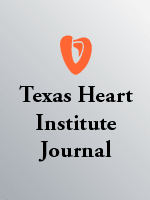
TEXAS HEART INSTITUTE JOURNAL
Advancing Cardiovascular Knowledge, One Heartbeat at a Time.TEXAS HEART INSTITUTE JOURNAL, published by the renowned Texas Heart Institute, stands as a pivotal resource in the field of cardiology and cardiovascular medicine. With a history spanning over four decades since its establishment in 1982, this journal addresses a wide range of topics within its scope, including clinical studies, innovative treatments, and groundbreaking research in heart health. Despite its Q3 ranking in both Cardiology and Cardiovascular Medicine, the journal is committed to fostering advancement in medical knowledge and practice, providing an essential platform for healthcare professionals and researchers alike. While currently lacking open access, the journal is recognized for its contributions to the field, aiming to illuminate critical healthcare discussions and promote the exchange of ideas. For those interested in staying at the forefront of cardiovascular research, TEXAS HEART INSTITUTE JOURNAL offers invaluable insights and the latest developments shaping the future of heart care.
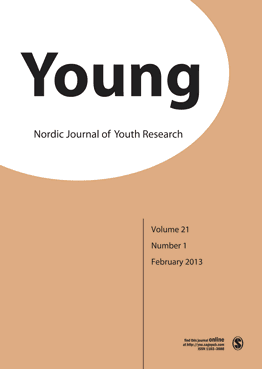
Young
Navigating the complexities of youth through scholarly discourse.Young, published by SAGE Publications Ltd, is a distinguished academic journal that plays a pivotal role in the fields of Developmental and Educational Psychology, Health (social science), and Sociology and Political Science. With an ISSN of 1103-3088 and an E-ISSN of 1741-3222, the journal has established itself as a vital resource for researchers and practitioners since its inception in 1993. As of 2023, it boasts impressive rankings, holding a Q1 designation in both Health (social science) and Sociology and Political Science, and a Q2 in Developmental and Educational Psychology, reflecting its high impact and relevance in contemporary scholarly discourse. While the journal does not currently offer open access options, it remains a key platform for disseminating innovative research that addresses critical societal issues. With its headquarters in the United States and a strong international presence, Young continues to foster the advancement of knowledge and practice in its respective fields, making it essential reading for anyone passionate about the intersection of research, policy, and education.
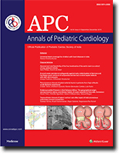
Annals of Pediatric Cardiology
Transforming Pediatric Cardiology with Every PublicationAnnals of Pediatric Cardiology is a distinguished peer-reviewed journal published by Wolters Kluwer Medknow Publications, focusing on the critical intersection of cardiology and pediatric health. Since its inception in 2008 as an Open Access journal, it has been at the forefront of disseminating significant research findings, clinical practices, and advancements in the field of pediatric cardiology. With an ISSN of 0974-2069 and an E-ISSN of 0974-5149, this journal is crucial for researchers, clinicians, and students seeking to enhance their knowledge in cardiological care for children. The journal's impact is underscored by its presence in the Q3 quartile in both Cardiology and Cardiovascular Medicine and Pediatrics, Perinatology, and Child Health categories for 2023, demonstrating its relevance in contemporary medical research. Operating out of India, the journal addresses a gap in pediatric cardiology literature, offering a platform for high-quality research and case studies that inform clinical practice and policy.

Journal of Echocardiography
Shaping the Future of Echocardiographic TechniquesThe Journal of Echocardiography, published by SPRINGER JAPAN KK, is a leading periodical dedicated to advancing the field of echocardiography and cardiac imaging. With an ISSN of 1349-0222 and an E-ISSN of 1880-344X, this journal serves as a vital resource for researchers, clinicians, and students alike, providing a platform for the dissemination of innovative research, case studies, and reviews focused on the latest echocardiographic techniques and applications. Operating under a prestigious publisher with a noteworthy reputation in the academic community, the journal features contributions that significantly impact the current understanding of cardiac health, making it essential reading for those in the fields of medicine, radiology, and imaging. As recognized in the 2023 Category Quartiles, it holds a solid Q3 ranking within the Radiology, Nuclear Medicine and Imaging category, further highlighting its relevance within the field, where it ranks #170 out of 333 according to Scopus. With coverage spanning from 2003 to 2024, the Journal of Echocardiography is committed to fostering an inclusive and comprehensive dialogue on the developments that shape modern echocardiographic practice.
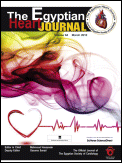
Egyptian Heart Journal
Connecting practitioners and researchers in the heart of science.The Egyptian Heart Journal, published by Springer, is a premier open-access journal dedicated to advancing the field of cardiology and cardiovascular medicine. As of 2023, it holds a Q3 classification within the category, showcasing its growing influence within the research community, and ranks 241 out of 387 in Scopus, reflecting a 37th percentile position. With an E-ISSN of 2090-911X, this journal has been open access since 2011, making it easily accessible to researchers, practitioners, and students alike. The journal aims to disseminate high-quality research articles, reviews, and case studies that contribute to the understanding and treatment of cardiovascular diseases. With its focus on innovative and practical solutions in cardiology, the Egyptian Heart Journal plays a critical role in shaping current and future cardiovascular research. Its global outreach and commitment to open access ensure that vital information is available to a wide audience, enhancing both scholarly discourse and clinical practice in the evolving landscape of cardiovascular medicine.

JOURNAL OF CARDIAC SURGERY
Shaping the future of heart health through quality research.The Journal of Cardiac Surgery, published by Wiley-Hindawi, stands as a pivotal resource in the fields of cardiology, cardiovascular medicine, and surgery, addressing critical developments and innovations in surgical techniques and patient management. Established in 1986, this esteemed journal has cultivated a reputation for nurturing high-quality research, as evidenced by its 2023 Scopus rankings, placing it in the top half for both Medicine: Surgery and Medicine: Cardiology and Cardiovascular Medicine. With an impact factor indicative of its influence in the scientific community, the journal is an essential platform for researchers, medical professionals, and students eager to stay abreast of advancements in cardiac surgery. Readers can access a range of original articles, reviews, and case studies that contribute significantly to our understanding of surgical practices and outcomes. As it converges towards its 2024 milestone, the journal continues to emphasize the importance of innovation in cardiac care, underscoring its commitment to improving patient outcomes worldwide.

International Journal of Cardiology Congenital Heart Disease
Connecting global experts in congenital heart disease.International Journal of Cardiology Congenital Heart Disease, published by ELSEVIER, stands as a premier open-access platform since 2020, dedicated to advancing the field of congenital heart disease. With the ISSN 2666-6685, this journal offers researchers, clinicians, and students access to high-quality, peer-reviewed articles that cover all aspects of congenital cardiology, from innovative treatment approaches to the latest in diagnostic techniques. The journal is designed to facilitate a global exchange of knowledge amongst professionals committed to improving patient outcomes and understanding of congenital heart defects. By promoting open access, it ensures that valuable research is free to all, fostering collaboration and innovation in this vital area of cardiovascular health.
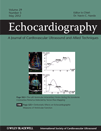
ECHOCARDIOGRAPHY-A JOURNAL OF CARDIOVASCULAR ULTRASOUND AND ALLIED TECHNIQUES
Bridging Research and Clinical Practice in UltrasoundECHOCARDIOGRAPHY: A Journal of Cardiovascular Ultrasound and Allied Techniques is a premier scholarly publication committed to advancing the field of cardiovascular imaging through the dissemination of high-quality research and clinical studies. Published by Wiley, this journal has been a vital resource since its inception in 1984, aiming to bridge the gap between ultrasound techniques and clinical practice over its converged years extending to 2024. With an ISSN of 0742-2822 and an E-ISSN of 1540-8175, the journal is indexed in notable databases and holds a respectable standing in its field, reflected in its Q3 rankings in Cardiovascular Medicine, Miscellaneous Medicine, and Radiology for 2023. Though currently not open access, the journal strives to provide valuable insights and innovative techniques to researchers, professionals, and students alike, fostering a deeper understanding of echocardiography and its impact on patient care. Located in the United States, the journal continues to serve as a cornerstone for contemporary cardiovascular research and education, ensuring that the latest advancements and practices are readily accessible to the medical community.

JOURNAL OF CARDIOVASCULAR MAGNETIC RESONANCE
Transforming patient care with pioneering studies in cardiovascular magnetic resonance.JOURNAL OF CARDIOVASCULAR MAGNETIC RESONANCE (ISSN: 1097-6647, E-ISSN: 1532-429X) is a premier open access journal published by Elsevier Science Inc in the United Kingdom, dedicated to advancing the field of cardiovascular imaging through magnetic resonance technology. Since its inception in 1999, the journal has established a robust reputation, evidenced by its ranking in the Q1 category across various fields including Cardiology and Cardiovascular Medicine, Family Practice, and Radiology, Nuclear Medicine and Imaging, as reported in its 2023 assessments. With a strong emphasis on high-quality research and innovations, this journal serves as a vital resource for researchers, clinicians, and students alike, providing vital insights that influence clinical practice and enhance patient care. Its rigorous peer-review process ensures that all contributing authors publish influential studies that are widely disseminated within the academic community. Researchers can access the journal freely since it has been an open access platform since 2008, promoting a wider reach and engagement within the cardiovascular imaging arena.

ARCHIVOS DE CARDIOLOGIA DE MEXICO
Empowering voices in cardiology through open access research.ARCHIVOS DE CARDIOLOGIA DE MEXICO is a premier open-access journal dedicated to advancing research and clinical practice in the field of cardiology and cardiovascular medicine. Published by the Instituto Nacional de Cardiología Ignacio Chávez since 2001, this journal offers a valuable platform for the dissemination of high-quality, peer-reviewed articles that span diverse aspects of cardiovascular health. With its current categorization in the fourth quartile (Q4) of cardiology journals and a Scopus rank of #319 out of 387, ARCHIVOS DE CARDIOLOGIA DE MEXICO is positioned within the dynamic landscape of cardiovascular research, presenting opportunities for both emerging and established voices in the field. It aims to promote discussion and innovation across various topics in cardiology, making it a crucial resource for researchers, healthcare professionals, and students keen on keeping abreast of developments in cardiovascular science. Accessible online since 2009, this journal fosters collaboration and knowledge sharing among specialists worldwide, establishing itself as a significant contributor to the global discourse on heart health.